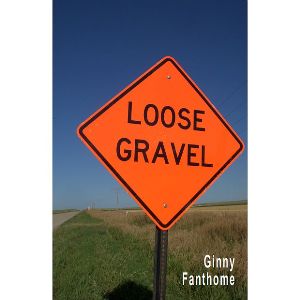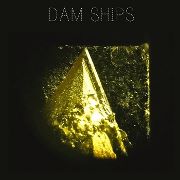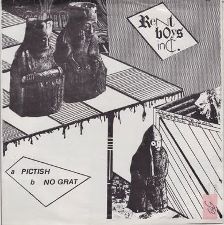| |
Ginny Fanthome

Loose Gravel
(independent) - 2021
Michael Panontin
|
Eighties hardcore was about as underground as you could get. Those who didn't live it will never quite comprehend just how far removed it was from the mainstream. There was no Sex Pistols or Clash for the hangers-on to latch on to. You bought all your clothes, save for your jeans, at Sally Anns and army surplus stores. Shows often took place in abandoned buildings, disused theatres and even people's basements. And the format of choice was the 45rpm record, at a time when cassettes and 12" singles ruled the shops. Hell, there wasn't even a CHiPs or a Quincy episode to unintentionally parody it to suburban America.
But for many kids back then, especially those growing up in those same suburbs, hardcore offered a refuge from a stultifying life of football games, high school proms and shopping malls. Musically, it was an exit out of an increasingly MTV-shaped world of new wave and hair metal. As evinced in Dope, Hookers and Pavement, Otto Buj's documentary on the Detroit/Windsor scene, hardcore was a safe space for the square pegs of North America, a place where they could fit in and feel genuinely accepted.
Of course, much of that camaraderie was of the brotherly sort. It was for the most part a male, or rather boy-dominated, world where the oft-used credo 'loud fast rules' was often code for physical aggression. The few females in the scene, for instance, could usually be found standing off to the sidelines while the boys exchanged elbows - and testosterone - in the mosh pit.
All of which brings us to Ginny Fanthome, a graduate of that scene and author of Loose Gravel, a fictional account of a four-piece hardcore band called Spooge and their packed-to-the-hilt campervan tour across what appears to be North America. Fanthome's entry point into hardcore fits much the same narrative. "I got into punk around 1980 because I'd always been an outcast as a kid," she told CM, "so I thought, 'Hell, why bother trying to fit in anymore?'. It really opened my world to some pretty cool people who'd also been outcasts and eventually became good friends."
On the surface, Spooge checks off a lot of the stereotypes one might have of an earnest-but-hapless bunch of kids fingering their way through the chords, clubs and crash pads of the day (which in this case is actually a decade or so later in 1994). With the group often finding themselves broken down on highways in the middle of nowhere, invariably piss drunk before a show or knocked out cold during one, or staring at a bar full of local yokels expecting a set of country music, Loose Gravel at times reads like a punk version of Spinal Tap.
But as anyone from the scene knows, there are unique individuals behind the black leather uniforms. And Spooge is no exception. On the surface, bassist Lion is a lunkheaded alcoholic, while guitarist Markus seems to live for post-show pussy. Rounding things out are Steve, the singer, who is gay and of South Asian background, and Sam the female drummer. But as the book progresses, Fanthome peels back the layers of her characters to reveal complex pasts and personalities, hardly a shocker to those in the scene but something I'm sure they wish others knew.
Loose Gravel for the most part reveals itself through dialogue, much of which is witty and acerbic, and entirely natural. It is narrated in the third person omniscient, which allows Fanthome to delve deeper into her characters. Sam comes off as the strongest and most perceptive of the four, and that seems to give the book a more feminine and empathetic tone. Fanthome also played drums, but she cautions against reading too much into this. "Sam's personal experience is absolutely nothing like mine, so there's no comparison there," she says, adding, "But we both have a mouth on us. You couldn't let people push you around. You had to have some balls and develop a pretty thick skin."
As with any rock 'n' roll tour, the pace is fast and full of surprises. Crusty old punks will recognize much of the antics, while younger readers will appreciate a glimpse into a crazier time before Tik Tok, streaming and downloads. For Fanthome, Loose Gravel is also about a scene in flux, when many hardcore bands had already morphed into metal and grunge and a new breed of emo kids lay ready to take the baton.
"I tried to capture a period in time," Fanthome says. "People kept saying that punk was dead, when that obviously wasn't the case. It wasn't dead, just passed out in the corner."
|
|
Suggestions

Dam Ships
Dam Ships EP
(independent)

1-Speed Bike
Pashto Translator Needed
(independent)

The Brandy Alexanders
The Brandy Alexanders EP
(independent)

Rent Boys Inc.
Pictish / No Grat - 7"
(independent)

Clockwise
Blow Your Soul Bright EP
(independent)

Automatisme
Non-representation Field (download track)
Constellation

Jerusalem in My Heart
Qalaq
Constellation

Monkey Dragon
Enter the Multiverse
Sonicturtle
|








